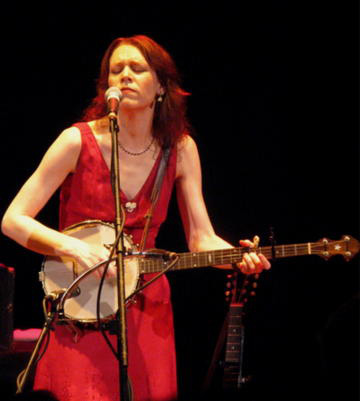Soaking up the rootsy atmosphere at this year’s Byron Bay Bluesfest (often to saturation point), I began thinking on music and the notion of authenticity. To be honest, I began to get a little irked by the relentless barrage of worn leather, road-dusted denim and sweat-ravaged Strats used in the style-language of this music.
There is a division of Fender Guitars, the iconic US manufacturer of the Stratocaster whose job it is to create a patina of age and wear on factory-new instruments. The ‘Road Worn’ range comes complete with distressed paintwork, rusted hardware and, apparently, built-in ‘history’. It really is a bunch of bullshit in anyone’s language, but of course they sell like hotcakes (or maybe out-of-date cheeseburgers).
And I often wonder if the same can be said of the very notion of ‘realness’ in 21st century Roots music.
Roots music – like World Music, a catch-all term invented by marketing/media to weave a saleable genre out of multiple disparate threads – comprises Blues, the less airbrushed forms of Country and the more earthbound elements of Jazz. A prerequisite seems to be that it appeals to everyday people and usually conjures up either elation or deep emotion – ‘good times’ or ‘blues’. Roots also prides itself on its ‘realness’.
I love Roots music deeply and its innovators and artists – both old and new – I hold in the highest regard. But is Roots music any more real than any other form of music? Is it any more real than Punk, or Hip-Hop, or Black Metal?
If a music’s level of ‘realness’ can be measured by the importance it has in a person’s life then the music of Dance-Rave people is easily as important as Roots – they live their musical culture minute by minute. If the question of history comes up – the longevity and historical development of a music in years – then J. S. Bach is the rootsiest muthafucka on da block.
If the idea of authenticity is where ‘realness’ comes from – music woven like veins or DNA helices into the fabric of a culture, inextricably – then I direct you back to the above para about Fender USA’s factory-made ‘soul’. These days, ‘rawness’ and authenticity can be bolted on, as skilfully and easily as a (factory-)‘rusted’ Strat tailpiece.
And it appears to be something Roots fans are all too ready to believe. Maybe because there is so much plastic fakery about, we imbue the lesser fakes with at least some hope of Truth.
________________________________________________
With these cogitations swirling in my mind, I decided to ask some people, way wiser than I, for their thoughts on Roots, ‘road-worn’ and realness. They are Johnny Cass, blues-guitarist and vocalist extraordinaire, DJ/producer Marc Scully, known to Australian dance-music fans as Omegaman and Jim Woff, man-about-town and bass-player with Sydney band Crow.
Here are their responses:
What does the term ‘roots’ music mean to you?
Johnny Cass: A derivative type of music. Just like the roots of a tree, genres of music grow from a base and then branch out into other genres.
Marc Scully: To me its about tradition – blues, country, reggae etc – some acoustic element, a certain heartfelt rawness, echoing back where it all began… back to basics…. at a grass roots level
Jim Woff: Someone once asked Thelonious Monk what he thought of folk music, he replied “all music is folk music”. The rural blues of the twenties and thirties sprout country and jazz, while the blues itself mutated countless ways using the same three or less chords. If we’re talking about how “roots” earnt it’s inverted commas, that seemed a 21st century thing. Good when it was Gillian Welch, not so hot when it was hippies with dreads and acoustic guitars and rich parents. The soundtrack to O Brother Where Art Thou was significant.
Does ‘roots’ music need to have a historical/traditional element to it?
Cass: Yes. The term roots has been overused and has lost its definition.To understand Roots music you must know its history and the struggles of the people of that time. To keep true to it meaning ‘roots’ music must have strong similarities to the roots genre it claims to be from. Those elements would be chord progressions, tonal qualities of instruments and melody.
Scully: I think so, an element of nostalgia and instrumentation is required, a nod to the past, you would not be playing a certain style if it weren’t for what came before you, something that inspired you to dig deeper, caught your ear in the first place – something styles don’t need re-inventing.
Woff: I think so. The historic/traditional aspect doesn’t necessarily have to be old, electronic music has a relatively short history for example. The work of the German bands in the seventies is a “roots” music, it’s been incredibly influential.
Can the idea of ‘roots’ be applied to any form of music?
Cass: No. I don’t really think you can say that roots can be applied to Classical music. Roots music was spawned from the urban areas, city streets and small towns and communities. It was a way for the people to express themselves, Roots music was not born from the Aristocracy it was born from the worker, the farmer, the musicians on the street.
Scully: As long as there’s a traditional element, having said that really I can’t see glitch, dubstep or techno being termed ‘Roots’ music.
Woff: Cave men blowing flutes, wandering minstrels on lutes, spreading the gossip and news from town to town… it’s all free reign, go nuts. I wish more people were as good as Beethoven but you can’t have everything.
Does the ‘roots’-iness of musics such as Country and Blues make them any more ‘real’?
Cass: I think the rawness of those musics keep it real. Acoustic forms are the most real. Those instruments don’t lie. The combination of flesh, wood and emotion really take aim at hearts. As the listener or the musician there is no room to hide. There is no wall of sound to get lost in, the message gets through, its more personal.
Scully: To me, yes… some artists can sound quite contrived, be real = be true. Raw, back to basics music played by real musicians – doesn’t have to be flash.
Woff: Those early recordings… Louis Armstrong… Hank Williams… the Blind men of the blues, Willie Johnson, Lemon Jefferson, WiIllie McTell… Duke Ellington… all rather real. You could appropriate their sound but it wouldn’t be real. You have to make your own sound to be real.
Does the ‘roots’ factor of music such as Blues hold back its future development and evolution?
Cass: Musically, maybe. Lyrically, no. Roots music evolves into new genres as it branches out. The most pure form of the genre will always be respected. What may end up happening is roots music won’t be performed as much. Without the support of mainstream it becomes harder for roots genres to exist. Only purists will hold onto its legacy.
Scully: Not as long as artists still carry a torch in salute of what came before them, you have to acknowledge the past, the birth of a style – without that, there is no future.
Woff: I’d argue that jazz hit the wall in the eighties but I’m sure there’d be plenty to take issue with that. Blues has never changed but it’s influence is a musical universe. From a young Jagger and Richards listening to Muddy Waters through Tom Waits reeling in Howlin’ Wolf to Nick Cave obsessing over John Lee Hooker, it’s all pervasive. Country hasn’t changed much.
What are your feelings on current ‘roots’ music in particular and the wider art/product of music in general?
Cass: Reality talent shows concern me. Their lack of integrity make music take the back seat. Those shows are not about the music, and they are not about the performer, they are about getting the most viewers and exploiting people’s dreams, disabilities and personal crisis. I understand that it gets some musicians a chance they would not normally get, but it’s fleeting. Viewers that sit at home and don’t experience the live factor of music. That is the real feeling of music. Watching music being made in real time in front of you, is like having your food cooked to order. It tastes better and feels better. That goes for music too.
Scully: Some of the modern roots artists can sound a little contrived… that goes for all styles. You are either true to your art or you are following musical trends. Way too many producers out there that know how to use a music software program and call themselves artists… Be yourself, learn how to play an instrument, you don’t have to be the best at it, as long as you are passionate about what you do.
Woff: “Roots” was a Noughties thing, wasn’t it? The good ones will continue to grow while the imposters are already considering another career path.







